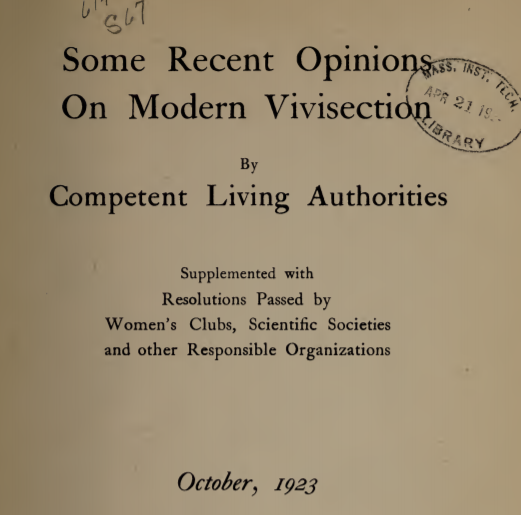
Title page of Some recent opinions on modern vivisection, by Society of Friends of Medical Progress, published 1923. Public domain via MIT Libraries.
This post is part of the MIT Libraries Public Domain Day celebration. Read the full text of public domain books digitized by the MIT Libraries, explore other volumes, and learn about the public domain at our website.
When I first saw Some recent opinions on modern vivisection by competent living authorities in the list of books we were digitizing, it immediately attracted my morbid curiosity. What are these opinions? Who, exactly, was vivisecting whom in 1923? And… surely these opinions are negative…?
The pamphlet’s first sentence did not answer my questions, but it is pretty bold: “Vivisection is a vital question involving the health of the civilized world, and everyone should know the truth about it.”
Um, if you say so, pamphlet. Tell me more.
It takes another page and a half of Lovecraftian, slow-reveal horror to actually state the “modern opinion.” That first statement? “On investigation it has been found that almost all the really great men and women who have expressed themselves as opposed to vivisection are dead.”
Did… did you kill them? Did you… vivisect them?
Joking aside, the predominant argument seems to be that, with recent (to 1923) developments in anesthesia, the benefits to medical knowledge obtained from surgery on live animals (yes, for some partial relief, they seem to be only talking about non-human animals) outweigh the moral and ethical harms, and the rest of the pamphlet cites medical and moral leaders who agree.
One Wikipedia rabbit-hole later, I’ve learned that pro- and anti- vivisection movements alternated sway throughout the 19th and early 20th centuries, and that anesthesia was indeed developing. Another pamphlet in the digitized collection explains the origins of the society which authored Some Recent Opinions, which was founded in part to combat the antivivisection and antivaccination movements of the time (anti-vaxx movements are apparently not a new thing! I would not have paired them with anti-vivisection, however).
So, propaganda and counter-propaganda? Do the benefits to medical knowledge really outweigh the costs? The Society of Friends of Medical Progress (authors of this pamphlet) certainly think so, while the American Anti-Vivisection Society (founded around the same time, and still active today) certainly do not. “Competent Living Authorities” may disagree.

